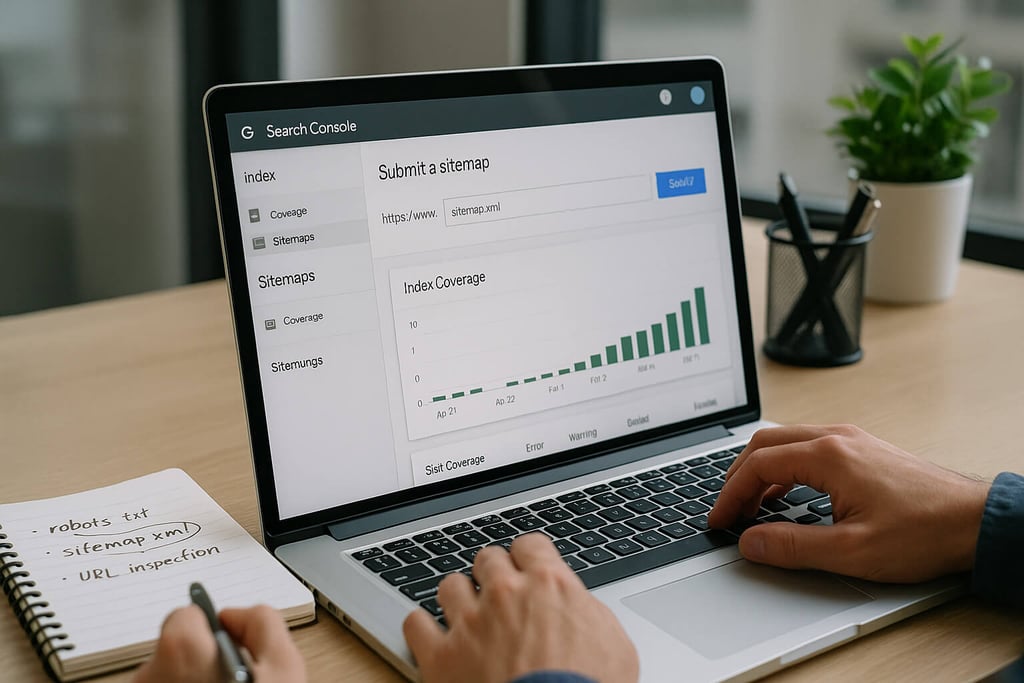SEOJet Flight Blog
Get Your Website on Google: Get Google to Notice Your Site
Get Your Website on Google: Make It Visible. Learn how to get your website indexed and improve its visibility on Google. Ensure your site is found!
SEO STRATEGY
Ardene Stoneman
5/10/20256 min read


How to Get Your Website on Google and Indexed Properly
Getting your website on Google isn’t automatic. Even if you’ve launched a site, that doesn’t mean Google has seen it or included it in its search engine results.
This article walks through how to get your website indexed, why it matters, and how to improve your chances of showing up in search results.
Whether you're using a website builder or coding from scratch, the steps here apply.
Article Outline
What does it mean to get your website on Google?
How does Google index websites?
How to check if your site is indexed by Google
Why Google might not index your website
How to use Google Search Console to get indexed
Submit a sitemap to Google: why it matters
Help search engines understand your website content
Improve your website to increase visibility
Using backlinks to get noticed by Google
What role does Google My Business play?
Does your website builder affect indexing?
How long it takes for Google to index a new site
Tips to help your website get more search traffic
1. What does it mean to get your website on Google?
When people talk about getting your website on Google, they’re usually referring to getting it indexed.
That means Google has crawled your site, processed the content, and included it in its index.
Once this happens, your pages can start showing in search engine results when users search relevant terms.
Being indexed isn’t the same as ranking well. Indexing is the first step. Ranking comes later and depends on relevance, authority, and quality.
If Google hasn’t indexed your site, it won’t appear on Google no matter what users type in.
2. How does Google index websites?
Google uses automated bots called crawlers or spiders. These bots follow links from known pages to discover new content.
Once a crawler lands on your site, it tries to read and understand your website pages.
If your site is easy to crawl and doesn’t block access with technical errors or settings, Google adds it to the index. This index is what powers all of Google’s search results.
To help Google to crawl and index your website efficiently, it’s important to:
Keep your content accessible
Use clean internal linking
Avoid blocking crawlers in your robots.txt file
All these give signals to Google that your site is ready to be indexed.
3. How to check if your site is indexed by Google
Before doing anything else, check if your site is already indexed. Go to the Google search bar and type:
site:yourdomain.com
This search query returns all pages Google has indexed from your site. If nothing shows up, your site hasn’t been indexed yet.
You can also use Google Search Console to check. Once verified, the Search Console account shows which pages have been indexed and which haven’t.
Make sure to check for:
Index coverage errors
Pages excluded from the index
URLs marked as ‘noindex’
This will give you a clear idea of where to focus next.
4. Why Google might not index your website
There are several reasons your website might not appear on Google:
You haven’t submitted your site to Google
Your content is thin or duplicate
Google is blocked from indexing by technical settings
The site is brand new and Google hasn’t discovered it yet
It lacks links pointing to it (backlinks)
Sometimes, issues with your content management system or website builder can also prevent indexing. Google might also skip over parts of your site if the structure is unclear or the content seems unhelpful.
Even if your site is live, it might still take time for Google to discover and index it properly. Weeks for Google to fully process a site is not unusual, especially if you haven’t taken active steps.
5. How to use Google Search Console to get indexed
Google Search Console is one of the best tools you can use to manage indexing. It’s free and gives you direct communication with Google’s indexing systems.
Steps:
Create or sign in to your Google Search Console account
Add your website as a property
Verify ownership (you’ll get several methods, including HTML tag, file upload, or DNS settings)
Submit your sitemap (we’ll cover this next)
Use the ‘URL Inspection Tool’ to request indexing for individual pages
If there’s one tool that helps Google to index your website faster, it’s this one. It also helps you spot crawl errors and index coverage issues.
6. Submit a sitemap to Google: why it matters
A sitemap is a list of URLs you want Google to index. It’s especially useful for large sites or websites with complex structures.
Submitting a sitemap to Google can:
Help Google discover all the pages on your website
Speed up indexing for new content
Avoid missing important pages
You can generate a sitemap using most website builders or content management systems. Then, go to Google Search Console and submit your sitemap to Google through the 'Sitemaps' section.
Make sure the sitemap includes only live, indexable pages.
7. Help search engines understand your website content
The better search engines understand your content, the more likely they are to index it and show it in the right search queries.
Use these techniques to help search engines understand your website:
Use clear, descriptive titles and meta descriptions
Add structured data (schema markup) where relevant
Keep your navigation simple and logical
Write relevant, original content on every page of your website
Internal links also tell search engines how pages relate to each other. This tells search engines which pages matter most.
8. Improve your website to increase visibility
Indexing is only one step. If you want your website to get noticed and drive traffic, you need to improve your website further.
A few ways to do that:
Improve your page speed
Make sure your site works well on mobile
Update your website regularly
Fix any broken links or technical issues
Write content that matches search intent
Google uses many factors to rank pages, and performance is one of them. The better your site works, the easier it is for Google to crawl and index.
Good content on your website sends Google positive signals. If users engage with your pages, you’ll also see better results over time.
9. Using backlinks to get noticed by Google
Backlinks help Google discover your site. When another site links to yours, it sends Google a signal that your content might be worth indexing.
To get backlinks:
List your business on local directories
Contribute to relevant forums or seo blogs
Share useful content that others might want to reference
Even a few solid backlinks from reputable sites can help your website get indexed faster. They also help you start building authority, which can improve your search rankings.
Links to your website are still one of the strongest indicators of trust and relevance.
10. What role does Google My Business play?
For local businesses, creating a Google Business Profile helps your website appear in Google Maps and local search results. It won’t get your site indexed directly, but it adds another way for users to find your business online.
To submit your business to Google:
Set up a Google business account
Add your business details
Verify your location
Link to your website
This won’t impact your whole site, but it can improve your visibility on Google for location-based searches.
If your business is listed, it’s also more likely that Google will find and index your homepage faster.
11. Does your website builder affect indexing?
Some website builders are better optimised for search engine indexing than others. Look for platforms that:
Let you customise meta tags and URLs
Support sitemap generation
Don’t restrict access to robots.txt or other crawl settings
Allow you to add structured data
If your platform blocks search bots or lacks flexibility, you’ll struggle to get your site indexed properly. Avoid builders that don’t give you access to these basics.
Always test your site using the URL Inspection Tool to make sure it’s crawlable.
12. How long it takes for Google to index a new site
There’s no fixed timeline. It can take a few hours or several weeks for Google to index a new website. Several factors affect the timeline:
Whether the site has been submitted to Search Console
If a sitemap has been uploaded
The number of backlinks pointing to the site
Crawl settings and technical issues
If you want Google to discover your site quickly, take proactive steps. Waiting passively doesn’t help.
Let Google know about your site through Search Console and backlinks. That’s the fastest way for Google to discover and crawl your content.
13. Tips to help your website get more search traffic
Getting indexed is step one. But if you want traffic to your website, go further.
Here are some tips:
Use keywords naturally throughout your content
Make sure each page serves a clear purpose
Target specific search queries with dedicated pages
Improve your metadata so you stand out in search results
Avoid duplicate content
Also consider user behaviour. Google uses engagement metrics to adjust rankings. If users bounce quickly or don’t interact, your appearance on Google could suffer.
The best way to improve your chances of getting noticed by Google is to create a site worth noticing.
Summary: Key Things to Remember
Use site:yourdomain.com to check if your site is indexed
Set up and use Google Search Console for control and feedback
Submit your sitemap to Google to speed up indexing
Avoid blocking crawlers with technical settings or poor site structure
Use backlinks to help Google discover your content
A well-built site with relevant content is more likely to get indexed
Google My Business helps for local search visibility
Not all website builders support SEO - choose carefully
Indexing takes time, but you can speed it up with the right actions
Always improve your website to keep Google interested
Want help getting your website indexed and ranking properly? At SEOJet, we don’t just talk about SEO - we implement it. From technical fixes to smart content planning, we help your website get seen for the right searches.
Contact SEOJet to improve your website visibility and search performance.
Services
Contact Us
Newsletter Signup
sales@seojet.co.uk
01934 289 404
© 2025. All rights reserved.


Locations
Weston-super-Mare
Somerset
Bristol
9am - 6pm, Monday to Friday
Suite 2, Unit 7, 12 Beaufigter Rd, Weston-super-Mare, BS24 8EE
